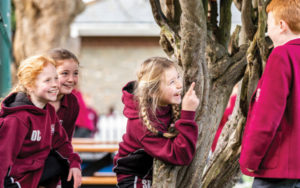
by Tamara Pearson
Senior Teacher (Curriculum), Our Lady of Sion Junior School
One cannot foresee the pressure you put on yourself as a parent when the midwife first hands your newborn to you. Which nappies are best? Will this car seat save my child’s life? What does my pram say about us as parents? These soon turn to comparisons over when children learn to crawl, walk and talk. Once at school age, we cannot help but wonder “where is my child in the class?”, “are they happy?”, “does the school of our choice match the needs of our child(ren)?”
We all want the best for our children. So what do we go for? The ‘hothouse’ or the ‘greenhouse’? Are our children just ‘surviving’ or truly ‘thriving’?
To even begin to answer these questions, we must consider what the true purpose of education and the role of schools is. What are our children learning and why? How are they learning? How is failure perceived? How are children assessed and how is that communicated? Is learning/attainment ‘fixed’ or is there genuine room for growth and development of the mind?
Research shows that childhood anxiety is the highest it has ever been. Circumstances, finances, relationships, expectations, social media, diet and exercise all play their part. What are schools doing to address these challenges? Fostering an authentic mindset in students is crucial; the jobs they will have in the future may not yet exist today.
Much has been made of Growth Mindset in the world of work and education, but, in reality, this is not enough. In order to prepare children for life’s challenges, they need a full toolbox of skills. Having a proactive/positive approach needs to be underpinned by social, emotional, and academic tools in order to fully educate the whole child. It is not about just working hard, it is about working smart.
As professional educators, it is our responsibility to prepare children in moving beyond being passive consumers of information and toward becoming active innovators. We must actively inspire and provide genuine opportunities to develop children’s passions.
 At our school, our children are driven by our ethos ‘Consideration Always’. As role models to the school community and beyond, we entrust them to develop and demonstrate the best version of themselves. Children develop when they are given the opportunity to do so. Mary Myatt’s philosophy of ‘high challenge, low threat’ leadsthe way.
At our school, our children are driven by our ethos ‘Consideration Always’. As role models to the school community and beyond, we entrust them to develop and demonstrate the best version of themselves. Children develop when they are given the opportunity to do so. Mary Myatt’s philosophy of ‘high challenge, low threat’ leadsthe way.
Expecting consistent productivity and positivity is not realistic, attainable, or even desirable; we may flit between fixed and growth mindsets. This is okay. The clincher is to remember that whatever setbacks we face, we can reflect/process our thoughts, then jump back in the saddle and continue the ride to our intended destination.
Equipped with a well-developed toolkit of social, emotional, and academic skills, every child can take on inevitable setbacks (and pressures of success) with integrity, resolve and good humour.
Tamara Pearson is a member of the Senior Leadership Team at Our Lady of Sion Junior School in Worthing.
She is also mother to a six year old who attends Sion and is passionate about helping the Juniors embrace every enrichment opportunity available.
She is a UK Parliament Teacher Ambassador and in the last three years has seen Sion Juniors rewrite its Curriculum, assessment approach, create an Intergenerational Project, achieve Beach School status, Eco Schools Silver Award and make meaningful links with the community.
www.sionschool.org.uk











